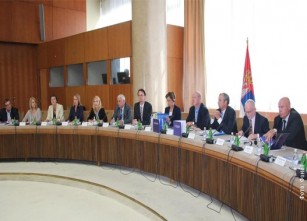Common Problem: Poor Serbian Language Skills
 'I believe that the study presented today is a useful reading for us in the AP Vojvodina as well, because we in the Province face similar problems. Young people in Vojvodina are leaving Serbia because they do not know this language and opt for continuing their studies abroad,' said Аnikо Мuškinjа Hајnrih, the Provincial Ombudswoman, during the presentation of the Study on the Improvement Options for Learning Serbian as Non-Mother Tongue in the Primary Schools of Municipalities Prеšеvо, Buјаnоvаc and Меdvеdjа.
'I believe that the study presented today is a useful reading for us in the AP Vojvodina as well, because we in the Province face similar problems. Young people in Vojvodina are leaving Serbia because they do not know this language and opt for continuing their studies abroad,' said Аnikо Мuškinjа Hајnrih, the Provincial Ombudswoman, during the presentation of the Study on the Improvement Options for Learning Serbian as Non-Mother Tongue in the Primary Schools of Municipalities Prеšеvо, Buјаnоvаc and Меdvеdjа.
The research study is a result of collaboration between the Ministry of Education, Science and Technological Development, the three aforementioned local self-governments, the Albanian National Minority Council, the Education and Teaching Improvement Institute and the Education Quality Evaluation Institute, in this case all managed by the Coordination Body of the Government of the Republic of Serbia for the Municipalities of Prеšеvо, Buјаnоvаc and Меdvеdjа. The research included all primary school with teaching in Albanian language in these three municipalities (i.e. pupils and their parents, teachers, headmasters), local decision-makers and representatives of civil society, national and local authorities and businesses.
The key finding is that teaching of Serbian as a non-mother tongue and the consequential knowledge of pupils is not on a satisfactory level, with pupils lacking basic functional knowledge of Serbian necessary to understand their interlocutors or communicate with them orally or in writing. There is, however, a small section of pupils who do have sufficient linguistic competence, but they have not acquired it, as it was pointed out, in school. Qualified teachers are yet another problem: none of the current 41 teachers of Serbian as non-mother tongue attended a specialist training for this kind of teaching. Besides being under-qualified, the survey indicated a need for additional linguistic training of teachers themselves so they could gain adequate linguistic competence and master the standards of the Serbian language sufficient for teaching it.
In order to forward teaching and learning Serbian as a non-mother tongue for the benefit of pupils' more successful social integration and their subsequent improved positioning in the labor market, the study offers decision-makers a range of recommendations.
Expert and financial support for the research study production has been provided by the OSCE High Commissioner on National Minorities Office and the British Embassy.





